【英语】动词详解+例句
英语动词的用法归纳总结

英语动词的用法归纳总结动词是英语语法中的一个重要部分,它用于表示一个人、物或事物所做的动作、行为或状态。
下面是几种常见的英语动词用法的总结:1. 及物动词(Transitive verbs):表示动作的动词后面可以接一个宾语,宾语接在动词的后面,它们之间有直接的关系。
例如:I kicked the ball.(我踢了球。
)2. 不及物动词(Intransitive verbs):表示动作的动词后面没有宾语,它们自己就是整个谓语,不需要补充其他成分。
例如:He sleeps.(他睡觉。
)3. 联系动词(Linking verbs):用于连接主语和主语的补足语,对主语进行描述或指示。
常见的连接动词有be(是、在)、seem(似乎)、become(变成)等。
例如:He is a teacher.(他是一名教师。
)4. 助动词(Auxiliary verbs):帮助其他动词构成时态、语态和情态的动词。
常见的助动词有be、do、have等。
例如:Heis studying.(他正在学习。
)5. 情态动词(Modal verbs):用于表示说话人对某个行为或状态的看法、推测、建议、许可等。
常见的情态动词有can、could、may、might等。
例如:I can swim.(我会游泳。
)6. 及物动词+副词(Phrasal verbs):由一个动词和一个副词组成的短语,表示特定的意义。
例如:She turned up the volume.(她调高了音量。
)7. 不及物动词+介词(Prepositional verbs):由一个动词和一个介词组成的短语,表示特定的意义。
例如:He insisted on going.(他坚持要去。
)8. 及物动词+宾补(Transitive verbs with object complements):动词之后有一个宾语和一个宾补,它对宾语进行进一步的描述或说明。
例如:They named the baby John.(他们给宝宝起名叫约翰。
【英语】非谓语动词详解+例句
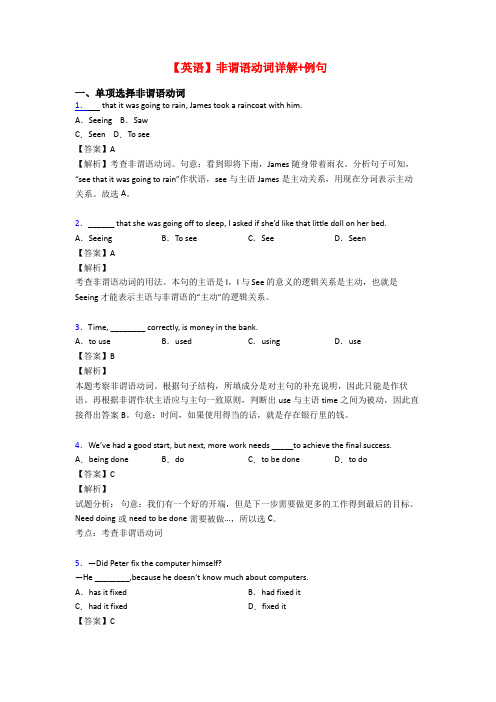
A.found B.finding
C.having found D.to find
【答案】D
【解析】考查非谓语动词。句意:学生们上网是为了找到他们理想大学的更多的信息。此处表示目的用不定式,指上网的目的。故选D。
【答案】C
【解析】
【详解】
考查固定短语。句意:——Peter自己修的电脑吗?——他让别人修的,因为他不太懂电脑。have sb. done是过去分词作宾语补足语,表示“使(让,请)别人做某事”。根据所提供的情景because he doesn’t know much about computers可判断出他找别人维修了电脑。故选C。
【答案】B
【解析】
【详解】
考查非谓语动词。句意:我很兴奋我的水下照片出现在《国家地理》杂志里和封面上。have sth done使某事被做,这是个固定用法。故选B。
12.New policies, _______ to insure that compulsory education is truly free, ________ by the local government across China since the start of school on September 1.
【英语】非谓语动词详解+例句
一、单项选择非谓语动词
1.that it was going to rain, James took a raincoat with him.
A.Seeing B.Saw
【高中英语】get短语动词22条(详解附例句)(二)
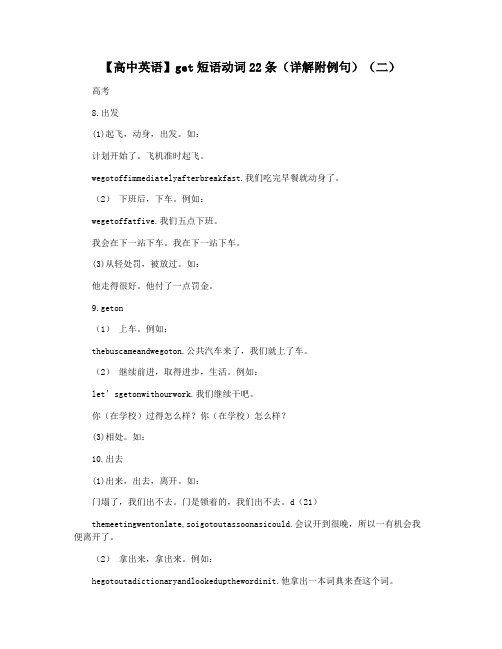
【高中英语】get短语动词22条(详解附例句)(二)高考8.出发(1)起飞,动身,出发。
如:计划开始了。
飞机准时起飞。
wegotoffimmediatelyafterbreakfast.我们吃完早餐就动身了。
(2)下班后,下车。
例如:wegetoffatfive.我们五点下班。
我会在下一站下车。
我在下一站下车。
(3)从轻处罚,被放过。
如:他走得很好。
他付了一点罚金。
9.geton(1)上车。
例如:thebuscameandwegoton.公共汽车来了,我们就上了车。
(2)继续前进,取得进步,生活。
例如:let’sgetonwithourwork.我们继续干吧。
你(在学校)过得怎么样?你(在学校)怎么样?(3)相处。
如:10.出去(1)出来,出去,离开。
如:门塌了,我们出不去。
门是锁着的,我们出不去。
d(21)themeetingwentonlate,soigotoutassoonasicould.会议开到很晚,所以一有机会我便离开了。
(2)拿出来,拿出来。
例如:hegotoutadictionaryandlookedupthewordinit.他拿出一本词典来查这个词。
(3)发布,发布。
例如:wehopetogetthereportoutbeforetheendofthemonth.我们希望在这个月底发表这个报告。
(4)泄露出去。
例如:ifthesecretgetsout,therewillbetrouble.如果秘密泄漏出去,那就麻烦了。
11.逃离(1)逃避,躲掉。
如:他请求帮助我。
他试图避免给我帮助。
hewilldoanythingtogetoutofwork.为了逃避工作,他什么事都干得出来。
(2)使说(取出等)。
例如:hetriedtogetmoneyoutofher.他设法要她出钱。
警察对他进行了调查。
警察强迫他说出真相。
(3)放弃,戒除,停止。
如:你必须改掉这个坏习惯。
你必须改掉那个坏习惯。
英语动词分类讲解及练习(有答案)
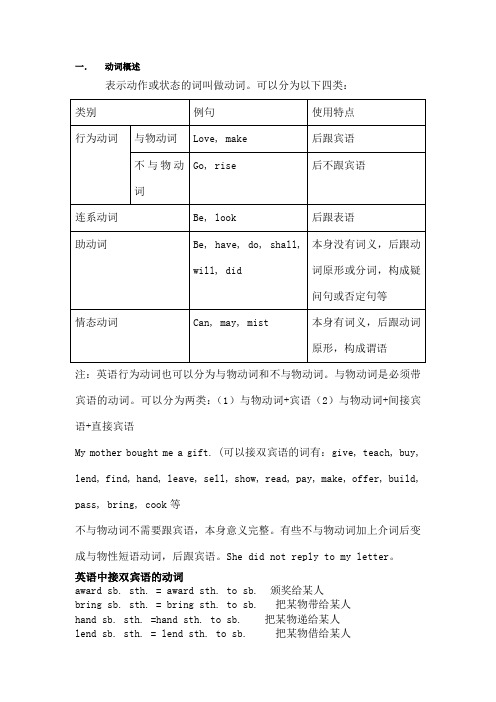
一.动词概述表示动作或状态的词叫做动词。
可以分为以下四类:注:英语行为动词也可以分为与物动词和不与物动词。
与物动词是必须带宾语的动词。
可以分为两类:(1)与物动词+宾语(2)与物动词+间接宾语+直接宾语My mother bought me a gift. (可以接双宾语的词有:give, teach, buy, lend, find, hand, leave, sell, show, read, pay, make, offer, build, pass, bring, cook等不与物动词不需要跟宾语,本身意义完整。
有些不与物动词加上介词后变成与物性短语动词,后跟宾语。
She did not reply to my letter。
英语中接双宾语的动词award sb. sth. = award sth. to sb. 颁奖给某人bring sb. sth. = bring sth. to sb. 把某物带给某人hand sb. sth. =hand sth. to sb. 把某物递给某人lend sb. sth. = lend sth. to sb. 把某物借给某人mail sb. sth. = mail sth. to sb. 把某物寄给某人offer sb. sth. = offer sth. to sb. 将某物给某人owe sb. sth. = owe sth. to sb. 欠某人某物pass sb. sth. = pass sth. to sb. 把某物递给某人pay sb. sth. = pay sth. to sb. 付给某人某物(钱)post sb. sth. = post sth. to sb. 把某物寄给某人read sb. sth. = read sth. to sb. 把某物读给某人听return sb.sth. = return sth. to sb. 把某物还给某人send sb. sth. = send sth. to sb. 把某物送给某人sell sb. sth. = sell sth. to sb. 把某物卖给某人serve sb. sth. = serve sth. to sb. 拿某物招待某人show sb. sth. = show sth. to sb. 拿某物给某人看take sb. sth. = take sth. to sb. 把某物拿给某人teach sb. sth. = teach sth. to sb. 教某人某物tell sb. sth. = tell sth. to sb. 告诉某人某情况throw sb. sth. = throw sth. to sb. 把某物扔给某人write sb. sth. = write sth. to sb. 给某人写信2、双宾语易位时需借助介词for的常用动词book sb. sth. = book sth. for sb. 为某人预定某物buy sb. sth. = buy sth. for sb. 为某人买某物choose sb. sth. = choose sth. for sb. 为某人选某物cook sb. sth. = cook sth. for sb. 为某人煮某物draw sb. sth. = draw sth. for sb. 为某人画某物fetch sb. sth. = fetch sth. for sb. 为某人去取某物find sb. sth. = find sth. for sb. 为某人找到某物fix sb. sth. = fix sth. for sb. 为某人准备某物get sb. sth. = get sth. for sb. 为某人拿来某物make sb. sth. = make sth. for sb. 为某人做某物order sb. sth. = order sth. for sb. 为某人订购某物pick sb. sth. = pick sth. for sb. 为某人采摘某物prepare sb. sth. = prepare sth. for sb. 为某人准备某物save sb. sth. = save sth. for sb. 为某人留某物sing sb. sth. = sing sth. for sb. 为某人唱某物(歌)spare sb. sth. = spare sth. for sb. 为某人让出某物steal sb. sth. = steal sth. for sb. 为某人偷某物3、有的动词后接的双宾语易位时,既可用介词to引出间接宾语,也可用介词for引出间接宾语,含义相同。
英语单词加造句100句

100个动词及其造句一、动词:go1.一般现在时:I go to school by bus every day.(我每天乘公交车去上学。
)2.There be 句型:There is a park where I often go for a walk.(有一个我经常去散步的公园。
)3.一般过去时:I went to the zoo yesterday.(我昨天去了动物园。
)4.现在进行时:I am going to the store now.(我现在正在去商店。
)5.一般将来时:I will go to the cinema tomorrow.(我明天将去电影院。
)6.情态动词:I should go to bed early.(我应该早点睡觉。
)二、动词:come1.一般现在时:He comes to my house on weekends.(他周末来我家。
)2.There be 句型:There are many people who come to the concert.(有很多人来听音乐会。
)3.一般过去时:She came to see me last week.(她上周来看我了。
)4.现在进行时:They are coming to the party tonight.(他们今晚要来参加聚会。
)5.一般将来时:We will come back home next month.(我们下个月将回家。
)6.情态动词:You must come to the meeting.(你必须来参加会议。
)三、动词:do1.一般现在时:I do my homework after school.(我放学后做作业。
)2.There be 句型:There is much work to do.(有很多工作要做。
)3.一般过去时:He did a great job yesterday.(他昨天干得很棒。
常用动词的用法

常用动词的用法介绍常用动词的用法动词是句子中最关键的词类之一,用于描述人、物或事情的行为、状态和变化。
在英语中,常用动词的正确使用对于构建准确、流畅的句子至关重要。
本文将介绍一些常用动词的用法,并给出相应的例句,以帮助读者提高语言表达的准确性和流畅性。
1. Do(做,完成):- 用作实义动词时,表示执行特定的动作或任务。
例句:I do my homework every evening.(我每晚做作业。
) - 在疑问句或否定句中,用于表示一般动作的否定或疑问。
例句:Do you like ice cream?(你喜欢冰淇淋吗?)2. Have(有,拥有):- 表示某人/某物拥有或经历了某种状态或经历。
例句:She has a beautiful house.(她有一所漂亮的房子。
) - 表示完成某项动作或做过某种事情。
例句:I have visited Paris twice.(我去过巴黎两次。
)3. Be(是,存在):- 表示身份、状态或特征。
例句:I am a student.(我是一名学生。
)- 表示存在或位置。
例句:The book is on the table.(书在桌子上。
)4. Go(去,进行):- 表示移动到某个地方。
例句:I want to go to the park.(我想去公园。
)- 表示进行某种活动。
例句:She goes swimming every weekend.(她每个周末去游泳。
)5. Make(制作,做):- 表示创造、制造或完成某件事情。
例句:She makes delicious cakes.(她做出美味的蛋糕。
) - 表示强迫或引起某种情感或感觉。
例句:The movie makes me feel sad.(这部电影让我感到悲伤。
)6. Take(拿,带):- 表示获取、接受或拿走某物。
例句:Can you take this package for me?(你能帮我拿这个包裹吗?)- 表示进行某种行动或采取某种方式。
(完整版)动词用法总结

(完整版)动词用法总结动词用法总结动词是语言中最基本的词类之一,用于描述动作、状态或发生的事件。
在英语中,动词的用法非常多样化,因此了解和掌握不同动词的用法是非常重要的。
以下是一些常见的动词用法总结:一般现在时 (Simple Present)- 表示经常性、惯性的动作或事实。
- 例句:He plays tennis every Saturday.(他每个星期六打网球。
)现在进行时 (Present Continuous)- 表示正在进行的动作。
- 例句:She is reading a book right now.(她正在看书。
)一般过去时 (Simple Past)- 表示过去发生的动作或事实。
- 例句:They visited their grandparents last weekend.(他们上个周末去探望了他们的祖父母。
)过去进行时 (Past Continuous)- 表示过去某一时刻正在进行的动作。
- 例句:I was studying when she called.(她打电话时,我正在研究。
)一般将来时 (Simple Future)- 表示将来要发生的动作或状态。
- 例句:We will go on vacation next month.(我们下个月要去度假。
)祈使句 (Imperative)- 表示命令、建议或请求。
- 例句:Please close the door.(请关上门。
)现在完成时 (Present Perfect)- 表示过去发生的动作对现在的影响。
- 例句:I have finished my homework.(我完成了我的家庭作业。
)以上是一些常见的动词用法总结。
掌握这些用法可以帮助你更准确地使用动词,使你的语言表达更加流利和地道。
还有其他更复杂的动词用法,需要根据具体语境进行学习和掌握。
动词大全动词英语词汇全解析
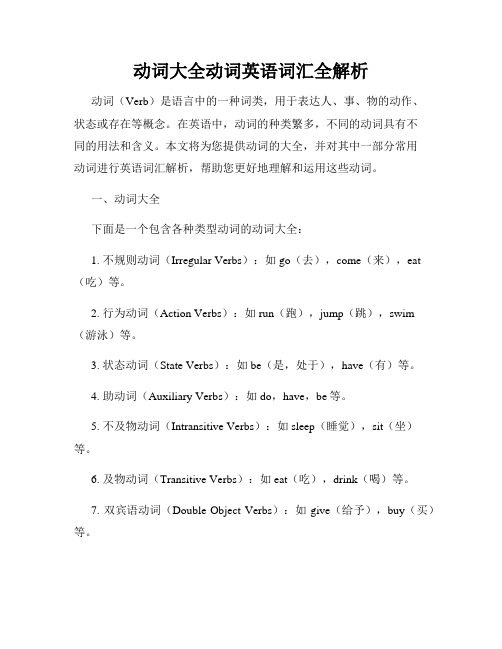
动词大全动词英语词汇全解析动词(Verb)是语言中的一种词类,用于表达人、事、物的动作、状态或存在等概念。
在英语中,动词的种类繁多,不同的动词具有不同的用法和含义。
本文将为您提供动词的大全,并对其中一部分常用动词进行英语词汇解析,帮助您更好地理解和运用这些动词。
一、动词大全下面是一个包含各种类型动词的动词大全:1. 不规则动词(Irregular Verbs):如 go(去),come(来),eat (吃)等。
2. 行为动词(Action Verbs):如 run(跑),jump(跳),swim(游泳)等。
3. 状态动词(State Verbs):如 be(是,处于),have(有)等。
4. 助动词(Auxiliary Verbs):如 do,have,be等。
5. 不及物动词(Intransitive Verbs):如 sleep(睡觉),sit(坐)等。
6. 及物动词(Transitive Verbs):如 eat(吃),drink(喝)等。
7. 双宾语动词(Double Object Verbs):如 give(给予),buy(买)等。
8. 反身动词(Reflexive Verbs):如 wash(洗)oneself,dress(穿衣)oneself等。
9. 连系动词(Linking Verbs):如 be(是),seem(似乎)等。
10. 情态动词(Modal Verbs):如 can(能),must(必须)等。
二、常用动词解析1. Go(去)- 词性:不规则动词(Irregular Verb)- 用法:表示离开或移动到某个地方- 例句:I go to school every day.(我每天去学校。
)2. Eat(吃)- 词性:行为动词(Action Verb)- 用法:表示进食或吃东西- 例句:I eat breakfast at 7 o'clock.(我7点吃早餐。
)3. Be(是,处于)- 词性:状态动词(State Verb)- 用法:表示存在、状态或性质等- 例句:She is a teacher.(她是一名教师。
常用英语动词短语英语解释加例句

常用英语动词短语英语解释加例句get someth ing across/over c ommun icate, make unders tanda ble I triedto get my pointacross/over to the judgebut she wouldn't listen.get along/on like each otherI was surpri sed how well my new girlfr iendand my sister got along/on.get around have mobili ty My grandf ather can get around fine in his new wheelc hair.get away go on a vacati on We worked so hard this year that we had to get away for a week.get away with someth ing do withou t beingnotice d or punish ed Jasonalways gets away with cheati ng in his mathstests.get back return We got back from our vacati on last week.get someth ing back receiv e someth ing you had before Liz finall y got her Scienc e notesback from my room-mate.get back at someon e retali ate 报仇, 反击, take reveng e My sister got back at me for steali ng her shoes. She stolemy favourite hat.get back into someth ing become intere stedin someth ing againI finall y got back into my noveland finish ed it.get on someth ing step onto a vehicl e We're goingto freeze out here if you don't let us get on the bus.get over someth ing recove r from an illnes s, loss, diffic ultyI just got over the flu and now my sister has it. get over someth ing overco me a proble m The compan y will have to closeif it can't get over the new regula tions.get roundto someth ing finall y find time to do (N.Amer.: get around to someth ing) I don't know when I am goingto get roundto writin g the thankyou cards.get togeth er meet (usuall y for social reason s) Let's get togeth er for a BBQ this weeken d.get up get out of bed I got up earlytodayto studyfor my exam.get up standYou should get up and give the elderl y man your seat.give someon e away reveal hidden inform ation aboutsomeon e His wife gave him away to the police.give someon e away take the brideto the altarMy father gave me away at my weddin g.give someth ing away ruin a secret My little sister gave the surpri se partyaway by accide nt.give someth ing away give someth ing to someon e for free The librar y was giving away old bookson Friday. give someth ing back return a borrow ed item I have to give theseskates back to Franzbefore his hockey game.give in reluct antly stop fighti ng or arguin gMy boyfri end didn't want to go to the ballet, but he finall y gave in. give someth ing out give to many people (usuall y at no cost) They were giving out free perfum e sample s at the depart mentstore.give someth ing up quit a habitI am giving up smokin g as of Januar y 1st.give up stop trying My mathshomewo rk was too diffic ult so I gave up.go aftersomeon e follow someon e My brothe r triedto go afterthe thiefin his car.go aftersometh ing try to achiev e someth ing I went aftermy dreamand now I am a publis hed writer.go agains t someon e compet e, oppose We are goingagains t the best soccer team in the city tonigh t.go aheadstart, procee d Please go aheadand eat before the food gets cold.go back return to a placeI have to go back home and get my lunch.go out leavehome to go on a social eventWe're goingout for dinner tonigh t.go out with someon e date J essehas been goingout with Luke sincethey met last winter.go over someth ing review Please go over your answer s before you submit your test.go over visitsomeon e nearby I haven't seen Tina for a long time. I thinkI'll go over for an hour or two.go withou t someth ingsuffer lack or depriv ation When I was young, we went withou t winter boots.grow apartstop beingfriend s over time My best friend and I grew apartaftershe change d school s.grow back regrow My rosesgrew back this summer.grow up become an adultWhen Jack growsup he wantsto be a firema n.grow out of someth ing get too big for Elizab eth needsa new pair of shoesbecaus e she has grownout of her old ones.grow into someth ing grow big enough to fit This bike is too big for him now, but he should grow into it by next year.hand someth ing down give someth ing used to someon e else I handed my old comicbooksdown to my little cousin.hand someth ing in submit I have to hand in my essayby Friday.hand someth ing out to distri buteto a groupof people We will hand out the invita tions at the door.hand someth ing over give (usuall y unwill ingly) The police askedthe man to hand over his wallet and his weapon s.hang in stay positi ve (N.Amer., inform al) Hang in there. I'm sure you'll find a job very soon.hang on wait a shorttime (inform al) Hang on whileI grab my coat and shoes!hang outspendtime relaxi ng (inform al)Instea d of goingto the partywe are just goingto hang out at my place. hang up end a phonecall He didn't say goodby e before he hung up.hold someon e/someth ing back p reven t from doing/goingI had to hold my dog back becaus e therewas a cat in the park.hold someth ing back hide an emotio n Jamieheld back his tearsat his grandf ather's funera l.hold on wait a shorttime Please hold on whileI transf er you to the SalesDepart ment.hold onto someon e/someth ing hold firmly usingyour handsor arms Hold onto your hat becaus e it's very windyoutsid e.hold someon e/someth ingup rob A man in a blackmask held the bank up this mornin g.keep on doingsometh ing contin ue doingKeep on stirri ng untilthe liquid comesto a boil.keep someth ing from someon e not tell We kept our relati onshi p from our parent s for two years.keep someon e/someth ing out stop from enteri ng Try to keep the wet dog out of the living room.keep someth ing up contin ue at the same rate If you keep thoseresult s up you will get into a greatcolleg e.let someon e down fail to suppor t or help, disapp ointI need you to be on time. Don't let me down this time. let someon e in allowto enterCan you let the cat in before you go to school?look aftersomeon e/someth ing take care of I have to look aftermy sick grandm other.look down on someon e thinkless of, consid er inferi or Ever sincewe stolethat chocol ate bar your dad has looked down on me.look for someon e/someth ing try to find I'm lookin g for a red dressfor the weddin g.look forwar d to someth ing be excite d aboutthe future I'm lookin g forwar d to the Christ mas break.look into someth ing invest igate We are goingto look into the priceof snowbo ardstoday.look out be carefu l, vigila nt, and take notice Look out! That car's goingto hit you!look out for someon e/someth ing be especi allyvigila nt for Don't forget to look out for snakes on the hiking trail.look someth ing over check, examin e Can you look over my essayfor spelli ng mistak es?look someth ing up search and find inform ation in a refere nce book or databa se We can look her phonenumber up on the Intern et.look up to someon e have a lot of respec t for My little sister has always looked up to me.make someth ing up invent, lie aboutsometh ing Josiemade up a storyaboutaboutwhy we were late. make up f orgiv e each otherWe were angrylast night, but we made up at breakf ast.make someon e up applycosmet ics to My sister s made me up for my gradua tionparty.mix someth ing up confus e two or more things I mixedup the twins' namesagain!pass away die His unclepassed away last nightaftera long illnes s.pass out faintIt was so hot in the church that an elderl y lady passed out.pass someth ing out give the same thingto many people The profes sor passed the textbo oks out before class.pass someth ing up declin e (usuall y someth ing good) I passed up the job becaus e I am afraid of change.pay someon e back return owed moneyThanks for buying my ticket. I'll pay you back on Friday.pay for someth ing be punish ed for doingsometh ing bad That bullywill pay for beingmean to my little brothe r.pick someth ing out choose I picked out threesweate rs for you to try on.pointsomeon e/someth ing out indica te with your finger I'll pointmy boyfri end out when he runs by.put someth ing down put what you are holdin g on a surfac e or floorYou can put the grocer ies down on the kitche n counte r.put someon e down insult, make someon e feel stupid The studen ts put the substi tuteteache r down becaus e his pantswere too short.put someth ing off postpo ne We are puttin g off our trip untilJanuar y becaus e of the hurric ane.put someth ing out exting uishThe neighb oursput the fire out before the fireme n arrive d.put someth ing togeth er assemb le I have to put the crib togeth er before the baby arrive s.put up with someon e/someth ing tolera te I don't thinkI can put up with threesmallchildr en in the car.put someth ing on p ut clothi ng/access ories on your body Don't forget to put on your new earrin gs for the party. run into someon e/someth ing meet unexpe ctedl y I ran into an old school-friend at the mall.run over someon e/someth ing drivea vehicl e over a person or thingI accide ntall y ran over your bicycl e in the drivew ay.run over/throug h someth ing rehear se, review Let's run over/throug h theselinesone more time before the show.run away leaveunexpe ctedl y, escape The childran away from home and has been missin g for threedays. run out have none left We ran out of shampo o so I had to wash my hair with soap.send someth ing back return (usuall y by mail) My letter got sent back to me becaus e I used the wrongstamp. set someth ing up arrang e, organi ze O ur boss set a meetin g up with the presid ent of the compan y.set someon e up trick, trap The police set up the car thiefby usinga hidden camera.shop around compar e prices I want to shop around a little before I decide on theseboots.show off act extraspecia l for people watchi ng (usuall y boastf ully)He always showsoff on his skateb oardsleepover stay somewh ere for the night(inform al) You should sleepover tonigh t if the weathe r is too bad to drivehome.sort someth ing out organi ze, resolv e a proble m We need to sort the billsout before the firstof the month. stickto someth ing contin ue doingsometh ing, limityourse lf to one partic ularthingYou will lose weight if you stickto the diet.switch someth ing off stop the energy flow, turn off The light's too bright. Couldyou switch it off.switch someth ing on startthe energy flow, turn on We heardthe news as soon as we switch ed on the car radio.take aftersomeon e resemb le a family member I take aftermy mother. We are both impati ent.take someth ing apartpurpos ely breakinto pieces He took the car brakes apartand foundthe proble m.take someth ing back return an item I have to take our new TV back becaus e it doesn't work.take off startto fly My planetakesoff in five minute s.take someth ing off remove someth ing (usuall y clothi ng) Take off your socksand shoesand come in the lake!take someth ing out remove from a placeor thingCan you take the garbag e out to the street for me?take someon e outpay for someon e to go somewh ere with you My grandp arent s took us out for dinner and a movie.tear someth ing up rip into pieces I tore up my ex-boyfri end's letter s and gave them back to him.thinkback rememb er (often+ to, someti mes + on) W hen I thinkback on my youth,I wish I had studie d harder.thinksometh ing over consid er I'll have to thinkthis job offerover before I make my finaldecisi on.throwsometh ing away dispos e of We threwour old furnit ure away when we won the lotter y.turn someth ing down decrea se the volume or streng th (heat, lightetc) Please turn the TV down whilethe guests are here.turn someth ing down refuse I turned the job down becaus e I don't want to move.turn someth ing off stop the energy flow, switch off Your mother wantsyou to turn the TV off and come for dinner.turn someth ing on startthe energy, switch on It's too dark in here. Let's turn some lights on.turn someth ing up increa se the volume or streng th (heat, lightetc) Can you turn the musicup? This is my favour ite song.turn up appear sudden ly Our cat turned up afterwe put poster s up all over the neighb ourho od.try someth ing on sample clothi ng I'm goingto try thesejeanson, but I don't thinkthey will fit.try someth ing out test I am goingto try this new brandof deterg ent out.use someth ing upfinish the supply The kids used all of the toothp asteup so we need to buy some more. wake up stop sleepi ngWe have to wake up earlyfor work on Monday.warm someon e/someth ing up increa se the temper ature You can warm your feet up in frontof the firepl ace. warm up prepar e body for exerci se I always warm up by doingsit-ups before I go for a run.wear off fade away Most of my make-up wore off before I got to the party.work out exerci se I work out at the gym threetimesa week.work out be succes sfulOur plan worked out fine.work someth ing out make a calcul ation We have to work out the totalcost before we buy the house。
英语动词详解(1)

长难句例句
As colleges strive for market share, they are looking for names that project the image they want or reflect the changes they hope to make.
英语中的动词详解
一、系动词 二、实意动词 三、助动词
动词分类
一、系动词 二、实意动词 三、助动词
一、系动词
像一条纽带,把主语和表语“系”在一起。 常见系动词: 1)be动词 2)感官动词:feel, look, sound, taste, smell, seem,
appear 3)表“变化”:get, become, turn, grow 4)表“保持”:keep, stay, remain 5)表“终止”:prove, turn out 后来被发现是,最
suggestion.
2)不及物动词
本身意义完整后面不须跟宾语的实意动词。
Birds fly. My watch stopped. It happened in June 1932.
注意!!!
每个句子里有且仅有一个动词! 需要出现不止一个动词怎么办?
使用 非谓语动词!
非谓语动词
指在句子中不是谓语的动词,主要包括不定式、动 名词和分词(现在分词和过去分词)
由于要争夺市场份额,高校正在寻求更改校名,希 望新校名能够展现其想要的形hero who saved the child's life who dropped into the water.
所以,分析长难句时
先找出句子中所有的动词 再找出句子中所有的从句引导词和连词 即可初步判断这个句子中有几个从句 再从复合句中的第一个动词和第一个引导词入手,
动词的分类及用法总结
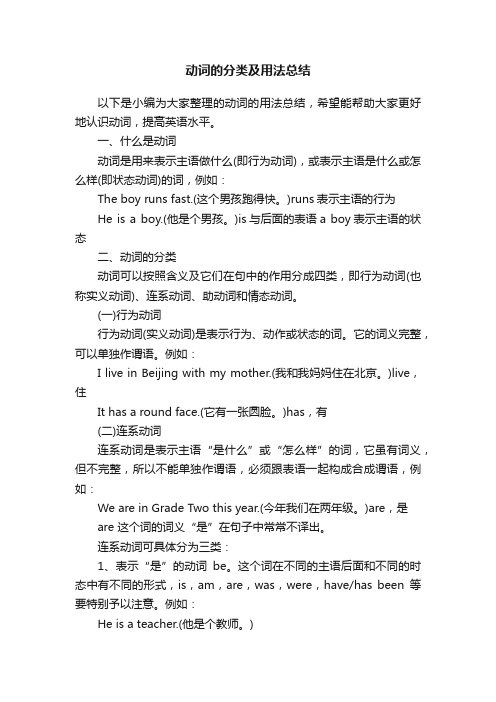
动词的分类及用法总结以下是小编为大家整理的动词的用法总结,希望能帮助大家更好地认识动词,提高英语水平。
一、什么是动词动词是用来表示主语做什么(即行为动词),或表示主语是什么或怎么样(即状态动词)的词,例如:The boy runs fast.(这个男孩跑得快。
)runs表示主语的行为He is a boy.(他是个男孩。
)is与后面的表语a boy表示主语的状态二、动词的分类动词可以按照含义及它们在句中的作用分成四类,即行为动词(也称实义动词)、连系动词、助动词和情态动词。
(一)行为动词行为动词(实义动词)是表示行为、动作或状态的词。
它的词义完整,可以单独作谓语。
例如:I live in Beijing with my mother.(我和我妈妈住在北京。
)live,住It has a round face.(它有一张圆脸。
)has,有(二)连系动词连系动词是表示主语“是什么”或“怎么样”的词,它虽有词义,但不完整,所以不能单独作谓语,必须跟表语一起构成合成谓语,例如:We are in Grade Two this year.(今年我们在两年级。
)are,是are 这个词的词义“是”在句子中常常不译出。
连系动词可具体分为三类:1、表示“是”的动词be。
这个词在不同的主语后面和不同的时态中有不同的形式,is,am,are,was,were,have/has been等要特别予以注意。
例如:He is a teacher.(他是个教师。
)He was a soldier two years ago.(两年前他是个士兵。
)We are Chinese.(我们是中国人。
)2、表示“感觉”的词,如look(看起来),feel(觉得,摸起来),smell(闻起来),sound(听起来),taste(尝起来)等,例如:She looked tired.(她看一去很疲劳。
)I feel ill.(我觉得不舒服。
动词的用法归纳总结

动词的用法归纳总结动词是英语中最重要、最基础的词汇之一,表示动作或状态。
在英语的语法中,动词是一个非常重要的元素,需要搭配正确的语态、时态、语气等等,才能表达出正确的含义和语义。
下面是动词的用法归纳总结:1. 动词在英语中通常是句子的谓语部分,描述动作或状态。
它可以用来表达一个人或物的行动或状态。
例如:I walk to school. (我走路上学。
)2. 动词也可以用来表示时间或一个事件的发生。
例如:The train arrives at 5 o'clock. (火车在5点钟到达。
)3. 动词的时态分为现在时、过去时和将来时。
现在时表示目前正在发生的动作或状态;过去时表示过去已经发生的动作或状态,将来时则表示将要发生的动作或状态。
4. 动词的语态分为主动语态和被动语态。
主动语态表示主语是动作的执行者,而被动语态表示主语是动作的承受者。
例如:主动语态:I write a letter.(我写信。
)被动语态:A letter is written by me.(信是我写的。
)5. 动词的语气分为陈述语气、祈使语气和虚拟语气。
陈述语气常用来陈述事实,祈使语气用于表示请求、命令、建议等,虚拟语气表示假设、虚拟情况等。
例如:陈述语气:She runs every morning.(她每天早晨跑步。
)祈使语气:Run faster!(跑得快点!)虚拟语气:If I were you, I would buy a new car.(如果我是你,我会买一辆新车。
)6. 动词可以用在不同的语态、时态和语气中,这些不同的形式被称为动词的变化形式。
例如:现在时的变化形式:I go to school.(我去学校。
)过去时的变化形式:I went to school.(我去过学校。
)将来时的变化形式:I will go to school.(我将要去学校。
)被动语态的变化形式:The letter was written by me.(这封信是我写的。
常用英语动词用法

常用英语动词用法英语动词是英语语言中最重要的词类之一,它们的用法灵活多样,掌握好动词的用法对于学好英语至关重要。
在这篇文章中,我们将探讨一些常用英语动词的常见用法。
一、Be 动词(am/is/are)Be 动词是英语中最基本的动词之一,用于表示“是”的概念。
1、 am 用于第一人称单数 I 之后,例如:I am a student (我是一名学生。
)2、 is 用于第三人称单数 he/she/it 之后,比如:He is a doctor (他是一名医生。
)She is very beautiful (她非常漂亮。
)It is a dog (它是一只狗。
)3、 are 用于第二人称 you 以及复数主语之后,像:You are my friend (你是我的朋友。
)We are happy (我们很开心。
)They are teachers (他们是老师。
)Be 动词还可以与现在分词构成进行时态,表示正在进行的动作,例如:I am reading a book (我正在读一本书。
)He is playing football (他正在踢足球。
)二、Have 动词Have 有“有;拥有”的意思,其用法如下:1、当主语是第三人称单数时,要用has,其余人称用have。
例如:I have a pen (我有一支笔。
)She has a car (她有一辆车。
)2、 have/has 还可以与过去分词构成完成时态,比如:I have finished my homework (我已经完成了我的作业。
)He has been to Beijing (他去过北京。
)三、Do 动词Do 主要用于构成疑问句和否定句,以及在一些特定的短语中使用。
1、构成疑问句:Do you like apples? (你喜欢苹果吗?)Does hego to school by bike? (他骑自行车上学吗?)2、构成否定句:I don't know (我不知道。
50个常用的英语动词以及简单的例句

50个常用的动词以及简单的例句:Run (跑步) - She likes to run in the park.Eat (吃) - They eat breakfast together every morning.Drink (喝) - He drinks coffee to wake up in the morning.Write (写) - She writes a novel in her free time.Read (读) - He reads a book every night before bed.Watch (看) - They like to watch movies on the weekends.Listen (听) - He enjoys listening to music while working.Speak (说话) - She speaks three languages fluently.Study (学习) - The students study for their exams.Dance (跳舞) - She loves to dance.Play (玩) - The children play in the park every day.Work (工作) - She works at a company downtown.Drive (开车) - He likes to drive his car on the weekends.Cook (烹饪) - She is a great cook and loves to make delicious food. Sing (唱歌) - He has a beautiful voice and likes to sing.Travel (旅行) - They love to travel and see new places.Sleep (睡觉) - He needs to get at least 8 hours of sleep every night. Jump (跳) - The kids love to jump on the trampoline.Swim (游泳) - She goes to the pool to swim every day.Fly (飞) - They enjoy flying to different countries for vacation. Laugh (笑) - They like to laugh and have a good time together.Smile (微笑) - She always smiles and makes everyone feel happy. Cry (哭) - The baby is crying and needs to be comforted.Hug (拥抱) - They give each other a hug to show their love. Kiss (亲吻) - They kiss each other goodbye before leaving. Wave (挥手) - He waves to his friends as they leave.Clap (鼓掌) - The audience claps to show their appreciation. Bow (鞠躬) - She bows to show respect.Cheer (欢呼) - The crowd cheers as the team scores.Shout (大喊) - He shouts for help when he sees a fire.Walk (走路) - They like to walk in the park on nice days.Fly (飞) - The bird flies from tree to tree.Ride (骑) - She loves to ride her bike in the park.Climb (爬) - The children climb the jungle gym.Slide (滑) - They love to slide down the playground slide. Swing (摇摆) - The child swings on the swings.Dig (挖) - He likes to dig in the garden.Plant (种植) - She loves to plant flowers and vegetables.Water (浇水) - He waters the plants every day.Pick (采摘) - They pick strawberries in the field.Paint (绘画) - She paints a beautiful picture.Draw (画) - He likes to draw in his spare time.Color (涂色) - The children love to color in coloring books. Cut (切) - She cuts the vegetables for dinner.Sew (缝纫) - She loves to sew and make her own clothes. Knit (编织) - She knits a warm scarf for winter.Build (建造) - He builds a birdhouse.Fix (修理) - He fixes the broken bike.Clean (清洁) - She cleans the house every week. Organize (整理) - He organizes his closet every few months.。
【英语】非谓语动词详解+例句

点评:本题难度适中。为了使话说得简明扼要,英语句子中某个单词、短语甚至从句或主句都可以省去。这种省去句子某些成分而保持句子意思不变的现象,称为省略。它是高中阶段的重要的语法项目,需要考生仔细分析句子结构,来确定省略的内容。这里考生容易误选A。
即学即练:He is rather difficult to make friends with, but his friendship,______ is more true than any other.
13.____ their hats into the air, the fans of the winning team let out loud shouts of victory.
A.To throwB.ThrownC.Being thrownD.Throwing
【答案】D
【解析】
【分析】
【详解】
A.askingB.asked
C.having askedD.to be asked
【答案】B
【解析】
试题分析:句意:当马克被问做教师这个职业时的看法。他说他发现这个工作是非常有趣和值得的。这里when引导的省略句,完整的是when he was asked his view about his job as a teacher,这里当从句中的主语与主句的主语一致,并且从句的谓语动词有be时,这时从句的主语与be同时省略,故选B。
C.exceeded D.exceeding
【答案】D
【解析】考查非谓语动词。句意:在这期间,大约创造13,500个新的工作,超过市场分析师持有的12,000个的预期数量。分析全句可知,这里指前一件事情所带来自然而然的结果,故用现在分词作结果状语。故选D。
【高中英语】get短语动词22条(详解附例句)
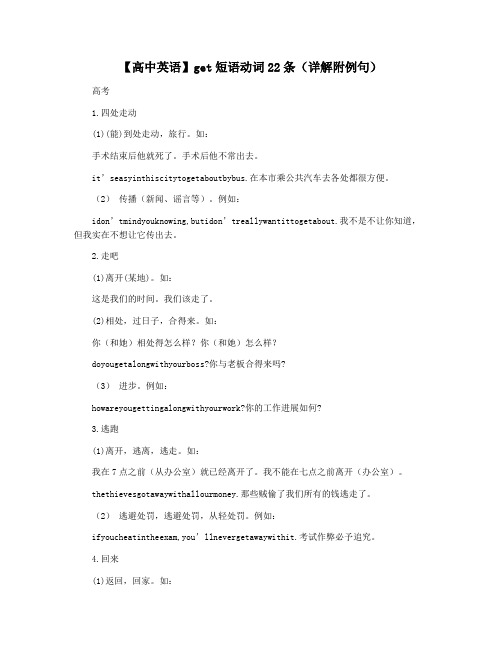
【高中英语】get短语动词22条(详解附例句)高考1.四处走动(1)(能)到处走动,旅行。
如:手术结束后他就死了。
手术后他不常出去。
it’seasyinthiscitytogetaboutbybus.在本市乘公共汽车去各处都很方便。
(2)传播(新闻、谣言等)。
例如:idon’tmindyouknowing,butidon’treallywantittogetabout.我不是不让你知道,但我实在不想让它传出去。
2.走吧(1)离开(某地)。
如:这是我们的时间。
我们该走了。
(2)相处,过日子,合得来。
如:你(和她)相处得怎么样?你(和她)怎么样?doyougetalongwithyourboss?你与老板合得来吗?(3)进步。
例如:howareyougettingalongwithyourwork?你的工作进展如何?3.逃跑(1)离开,逃离,逃走。
如:我在7点之前(从办公室)就已经离开了。
我不能在七点之前离开(办公室)。
thethievesgotawaywithallourmoney.那些贼偷了我们所有的钱逃走了。
(2)逃避处罚,逃避处罚,从轻处罚。
例如:ifyoucheatintheexam,you’llnevergetawaywithit.考试作弊必予追究。
4.回来(1)返回,回家。
如:你什么时候从巴黎回来?你什么时候从巴黎回来的?(2)取回,拿回,失而复得。
如:他把手表丢了。
他找到了丢失的手表。
wedecidedtogetthebooksback.我们决定把书要回来。
5.趴下,取下,放下,趴下,写下,躺下,咽下。
例如:theboyclimbedupthetreeandcouldn’tgetdown.小男孩爬上树,却下不来了。
他说,他对标准的质疑无法平息。
他说得太快了,我记不下他说的每句话。
wemanagedtogetdownenemyplanes.我们设法打下了两架敌机。
主题新闻是一个令人担忧的话题。
高中英语情态动词详细讲解及例句

高中英语情态动词详细讲解及例句-CAL-FENGHAI.-(YICAI)-Company One1一、情态动词无人称和数的变化,不能单独做谓语,只能和行为动词或状态动词构成谓语二、情态动词分为:情态助动词:can(could)、may(might)、must、have to (hadto )、ought to 、shall(should)、will(would) 12个半情态助动词:dare、need、used to、had better、would better(5个)三、情态助动词1.can and could1)ability:be able to do /manage to do/succeed in doing sth.eg.The army can defeat their enemy.eg.The army is able to defeat their enemy.eg.The army succeed in defeating their enemy.2)permission:eg.Can I smoke here?eg.You can’t smoke here.3)possibility:用在否定句、疑问句、感叹句中-eg.This can’t be done by him.当被用在肯定句中时,表达的是理论上的可能性,不涉及是否真的会发生eg.even expert drives can make mistakes.要表达现在或者将来的可能性,用may /might或could.eg.I may leave for Beijing next month.但在特殊疑问句中,或与副词hardly、only等连用的陈述句中表达可能性只用can/couldEg.where can the noise be coming from?eg.It can hardly be the postman,he comes only in the morning.4)有时会:the road can be blocked.5)could 表示轻微的怀疑或委婉的看法I’m sorry I couldn’t lend you the book now.His story could be true,but I hardly think it is.6)could 表示委婉的请求,主要用于疑问句,不用于肯定句Could you lend me some money?Yes,I can /No,I am afraid not.7)could 的常用结构:could+动词+比较级“非常,再.....不过了”It couldn’t be better.Couldn’t +过去分词+比较级“非常,再.....不过了”They couldn’t have tried harder to make me eel welcome.Can’t..too..=can never too“无论怎样...也不为过,越...越好”I can’t thank you too much.I owe my progress to you.Can’t (help/choose) but do/can but +动词原形“不得不,只好”We can but agree with him.Can’t help doing 忍不住,不得不I can’t help laughingCan’t be (it) 控制不住,没有办法It can’t be helpedCan’t....without 没有...就不能One can’t succeed without perseverance.2.may and might1)permission:May I use your pen?Yes,you may./No,you may not.2)Possibility:用于推测,表示不确定,不用于疑问句中She may know Tom’s address.出现I’m afraid.I’m not sure等表示不确定时,常用may/might.I’m afraid he might not come to attend the meeting today.从语气上判断,may表示的可能性比might 大,might更多的表示怀疑He may be very busy now.He might be very busy now.3)用于让步状语从句中However hard you may study,you cannot master English in a month.4)用于祈使句,表示祝愿May you succeed!5)might 常用于表示轻微的责备和委婉的请求You might post the letter for me if you are going near a post box.You might have let me know before!6)习惯用法:may as well do”理所当然,有足够的理由”She may be proud of her sonMay /might (just) as well do=had better do(最好)You might as well stay at home tonight.May/might as well+do A+as+do+B”与其做B不如做A”You might as well throw the money away as lend it to him.One may as well not know a thing at all as know it but imperfectly3.must and have to1)表示义务,一定要,必须You must arrive in good time.The meeting is very important.2)表示肯定性或难以避免,必然会,肯定会All men must die.3)must 表示有把握的推测,一定是,准时Must do/must be doing/must have doneThe tall fellow must be a basketball player.Let’s have something.You must be starving.He must have received mu letter which has mailed last week.4)must 表示非要,偏要,常以第二人称为主语,意指不耐或令人不愉快的事情,用于其他人称,表示主语固执,意为偏偏Why must you buy that car?Jane was never a pleasant young girl.After you gave her your advice,she must goand do the opposite.5)must 的三种否定形式表示不可能 must be --can’t be must have done--can’t have doneYou must have met him before.You can’t have met him before.表示不必 must do--need not to/don’t have toWe must get up at six tomorrow morning.We don’t have to get up at six tomorrow morning.表示决不能,严禁 must--mustn’tYou mustn’t park your car here.6)回答以must提问的句子Must we clean all the rooms?Yes ,you must/No ,you don’t have to/No ,you needn’t7)must 可做名词,表示必须有的东西,必须做的事Warm clothes are a must in the mountains.8)must和have to 表示必须时,有一下差别Must 表示的是说话人主观的看法,而have to则往往强调客观需要The play is not interesting ,I really must go now.I have to work when I was your age.Must 一般只表现在,have to 则有更多的时态。
考研英语语法(动词)详细解析总结(含例句)

考研英语语法(动词)详细解析总结(含例句)●一. 动词的分类后续语法内容的基础,同学们只需要了解清楚这些概念、能够明白区分,在后续长难句分析时对这些说法不陌生即可,不然遇到完形填空和翻译会一头雾水哦1.可作谓语动词:句子的核心句子成分中的谓语●实义动词:也叫做行为动词,因为这些动词都拥有实际的意义在考研英语中大部分的遇到的其实只需要区分及物和不及物动词,通常会在完形填空的选项和翻译中进行考察,但还是希望同学们能够认真学习理解,为自己的英语长难句打下坚实的基础●按照是否需要动作的承受者划分●及物动词:需要带个人或者物品在动词后面,就是说动作是有对象的,即宾语eg. read a book 读一本书●不及物动词:可以独立完成的动作,即动作没有对象eg. A cat sleeps. 一只猫睡觉●按照状态动作划分●动作动词:可以动起来的动作eg. eat 吃●状态动词:相对静止,表示一种状态eg. have 有;feel 感觉;own 拥有●系动词:也叫做连系动词,连系主语和表语●非常好理解,就是“赋值”的意思,把系动词后面的含义赋予给它之前的部分●am;is;are●eg. I am a girl. 我是一个女孩 (am的作用就是把女孩这个信息赋予给我)●keep;stay;seem;appear;feel;become;turn...●eg. The sky grew dark. 天空渐渐变暗(就是把暗这个信息赋值给天空)2.可辅助构成谓语动词:助动词不能独立做句子的谓语●概念●句子中的谓语动词本身有时候无法独立表达某些语法概念,需要其他词的辅助来表达;而这类辅助词自己本身不能做谓语动词●eg. The student will read a book. 这个学生将看书【如果我们想要表达将来时态,但动词本身并不能表达将来的意思,所以久必须在前面加上will来“辅助”完成表达;will就是构成将来时的助动词,并且will本身不能做谓语动词】●特征(判断)●(是否)辅助主动词构成语法概念●(是否)不能单独作谓语动词●分类●基本助动词:be;do;have作为助动词时,他们本身没有什么任何实际含义,但是要注意他们也可以作实义动词:be 存在;do做;have有●eg. The student is reading a book. 学生正在看书(辅助构成现在进行时)●eg. The student has read a book. 学生已经看过书了(辅助构成现在完成时)●eg. I do like you!我真的喜欢你(辅助构成强调句)●情态(助)动词注意:前三组后面的词是前面的过去式●can/couldcould在虚拟语气中更多使用●表能力(做…);会…;可以…●eg. I can read a book. 我可以看书(有能力)●eg. Can/Could I borrow your money?我可以找你借钱吗?(表请求或许可)●eg. Anything can happen. 什么事都可能发生(可能性)●may/might●表达请求,同上●或许;也许,表可能性,可能性程度小于can/could●表祝愿 eg. May you succeed!祝你成功!●shall/should●shall●构成将来时,同will●表推测、征求意见 eg. Shall we meet tomorrow?我们明天见怎么样?●表警告、命令 eg. You shall not pass!你不能通过!●should●表应当 eg. You should study now!你现在应该去学习!●表有一定根据的推测 eg. It should rain tomorrow. 明天应该会下雨(有天气预报一定的根据性)●构成虚拟语气(后续学习)●will/would●构成将来时(后续时态学习)●表请求、建议 eg. Will you lend my money?你愿意借我钱吗?●表推测、假设 eg. Ask him,he will/would know. 问他吧,他可能知道●must●表必须 eg. You must finish your homework!你必须做完作业!●表禁止 eg. You must not(mustn't)smoke here. 这里禁止吸烟注意:must not不是“不必须”的意思,而且“必须不”!●表肯定 eg. You must be hungry.(干饭时间到了)你肯定饿了吧●ought to 同should:应该●dare/dared 敢 eg. How dare you!你好大的胆子!●need●实义动词:需要 eg. I need you!我需要你!●情态动词:需要;有必要 eg. You don't need to study. 你不需要学习【相当于must表不需要的否定】●used to●表过去经常的事情,强调与现在的对比●eg. I used to eat apples,now I only eat bananas. 我过去经常吃苹果,但我现在只吃香蕉●半助动词:既像主动词又像助动词●be able to 表能力同can/could●表将要做,同will●be going to●be about to●had better3.不可作谓语动词:非谓语动词(非限定性动词)一个简单句中只能有一个谓语动词,所以其他动词只能以非谓语动词的形式出现●概念●不受主语限制、不被限定的动词,不具有表达时间和人称的作用(与谓语动词相反)●eg. I like to study. 我喜欢学习(like就是句子的谓语动词,受主语限制:helikes;而to study则不受主语限制)●不定式:to do(to + 动词原形)●充当句子主语 To eat an apple everyday is good for health. 一天吃一个苹果对健康有好处(to eat 不定式不受具体的人和时间限制)= It is good for health toeat an apple everyday. (虽然it做了形式主语,单核心还是to eat 不定式)●作后置定语 I have many books to read. 我有很多书要看(to read做后置定语来修饰books:我有很多书,什么样子的书呢?需要阅读的书)●作状语●表原因 I am surpised to get a thumbs-up. 我很惊讶(因为)得到一个赞= I am surpised because I get a thumbs-up.●表目的 I study to pass exams. 我复习为了考试顺利= I study in order that I can pass exams.●高级不定式:与后续时态结合●动名词:doing(动词原形+ing)●从名字也可以知道,就是把动词转化为名词性质使用,本质相当于名词●eg. Seeing is believing. 眼见为实(seeing作主语;believing作表语)●现在分词:doing(动词原形+ing)●本质相当于形容词,起修饰作用【表主动关系:描述做动作的人/物】●eg. The book is interesting. 这本书很有趣(书主动令人感到很有趣)●过去分词:done(一般动词原形 + ed,不规则动词需要积累记忆)●本质相当于形容词,起修饰作用【表被动关系:描述动作的接收者】●eg. I am interested in the book. 我对这本书感兴趣(我被这本书引起了兴趣)●二. 动词的时态动作的时间+动作的状态1.前言●英语的十六大时态●4种时间与4种状态排列组合就是英语语法的16种时态,但是时态体系过于庞大复杂,许多时态也非常少见,我们只需要学习常见的时态即可●时间:现在;过去;将来;过去将来【对于过去某一个时间点的将来,eg.昨天是前天的将来】●状态:一般;进行;完成;完成进行【动作完成了一部分,仍在进行】●为什么大家之前学习英语时态觉得是一团乱麻呢●难点1:时间&状态搅在一起在学校学习时态时,总是遇到一个时态学习一种时态,通常就是一会学过去完成时一会又是学一般现在时,没有清晰地认知时间和状态组合的方式,脑子里的时态杂糅在一起,让大家觉得时态很复杂很难●难点2:动词的变位在中文表达里,对于一个动作的完成和进行描述地非常简洁,例如:我正在吃饭;我吃饭了但是在英语里,则需要大家记动词的不同形式,eg.eat~ate~eaten 原型~过去式~过去分词●难点3:助动词英语时态的表达通常还需要助动词进行辅助,并且助动词会随着时态有不同的变形,例如助动词have,在现在完成时使用是have(has),而在过去完成时里使用是had2.1一般现在时●概念理解●动作发生在“现在”的时间段内经常发生的动作或者存在的状态●1. 表达事实没有状态限制,也没有时间限制●陈述一些事实、具有真理性的内容●eg. The sun rises in the east. 太阳从东边升起●eg. You love to learn. 你热爱学习●2. 表达习惯性、规律性、重复的动作●eg. I read books. 我阅读(我的习惯)(每天都发生的事情)●eg. You get up at 7 o'clock everyday. 你每天七点钟起床●3. 表达预计发生的事(客观的事实)●eg. The bus leaves at 6 PM tonight. 公交车今晚六点离站●形式用法●第一人称/第二人称/名词复数 + 动词原形●eg. We usually go to school at 7:30. 我们通常七点半去上学●eg. My parents work five days a week. 我的父母一周工作五天●第三人称单数(单三)+ 动词原型 + s注意:有些动词的单三形式有特殊变形,+s是普遍情况●eg. He likes to swim. 他喜欢游泳●eg. She goes shopping every weekend. 她每周末都去逛街3.2现在进行时●概念理解●动作发生在“现在”动作正在进行中,相当于中文中的“正在做某事”●形式用法●助动词be的变位(am/is/are)+ 动词的现在分词(动词原形 + ing)注意:有些动词的特殊变位需要大家积累记忆;例如:write去e+ing、get双写t+ing●eg. You are reading a book. 你正在看书●eg. I am writing papers. 我正在写论文●eg. She/He is doing homework. 她/他正在做作业4.3现在完成时●概念理解●1. 表示强调动作的影响或是结果●动作发生在“过去”并且已经完成这个动作对现在仍存在影响,强调对现在的影响●eg. I have lost my pen. 我的钢笔丢了(结果:我现在没有钢笔用)●eg. He has finished his work. 他的工作已经完成了(结果:他可以去休息了)●2. 表示动作的持续●动作从“过去”开始发生但还没有结束一直持续到现在,也可能还会持续下去●eg. You have been in school for 22 years. 你已经上学22年了(你从过去开始上学,持续到现在,已经持续22年了,你还可能继续持续下去)●eg. He has been busy since last week. 他从上周开始就一直很忙(持续到现在也很忙)●形式用法●助动词have的变位(have/has) + 动词的过去分词(通常动词原形 + ed)注意:有些动词的特殊变位需要大家积累记忆;例如:do~did~done●eg. I have been Wuhan before. 我之前去过武汉●eg. She hasn't finished her work yet. 她还没有完成工作5.4现在完成进行时●概念理解●动作从“过去”开始发生一直持续到现在,并且还会持续下去●可以理解为现在完成时和现在进行时的合体,强调动作的持续性●形式用法●助动词have的变位(have/has)+ been + 动词的现在分词●eg. The rabbit has been eating carrots. 兔子一直在吃胡萝卜(兔子已经吃了一段时间,还将继续吃下去)●eg. I have been watchinig this movie. 我在看这一部电影(我到现在为止已经看了一段时间了,我还要继续再看一段时间)6.5一般过去时●概念理解●就是一般现在时往前推了一个时间,动作发生在“过去”的时间动作发生了●形式用法●各人称 + 动词过去式(通常是动词原形 + ed)注意:不要与过去分词混淆,特殊动词需要记忆,例如:go~went;take~took●eg. I/We/You/He/She/It/They/The rabbit ate a carrot. 我/我们/你(们)/他/她/它/他们/这只兔子吃了一根胡萝卜7.6过去进行时●概念理解●动作发生在“过去”的某个时间段动作是当时进行中的●形式用法●助动词be的变位(was/were)+ 动词的现在分词(动词原形 + ing)●eg. I/He/She/It/The rabbit was eating a rabbit. 我/他/她/它//这只兔子吃了一根胡萝卜(在过去的某个时间点正在吃胡萝卜的过程)●eg. You/We/They were reading books. 你(们)/我们/他们处于过去的某个时间点正在看书的过程8.7️过去完成时●概念理解●就是现在完成时态往前推一个时间段,动作发生在“过去”并结束相对于过去的某一个时间造成了影响●形式用法●助动词have的变位(had) + 动词的过去分词(通常动词原形 + ed)●eg. I had eaten 5 carrots for lunch yesterday,so I wasn't hungry last night. 我昨天午饭吃了五根胡萝卜,所以我昨晚不饿(昨天中午发生的动作对昨天晚上造成了影响:我不饿)●eg. He tried to find me yesterday afternoon,but I had already gone to Wuhan. 他昨天本来想找我,但是我已经去武汉了(我可能昨天早上、前天——比昨天下午早的时间去武汉了,对昨天下午造成了影响:他没有找到我)9.8️一般将来时●概念理解●表示动作发生在“将来”的某一时间点动作将会发生(说话者十分肯定)●形式用法●各人称 + will + 动词原形这是最常见的将来时表达方式●eg. I/We/You/He/She/It/They/The rabbit will eat a carrot. 我/我们/你(们)/他/她/它/他们/这只兔子将要吃一根胡萝卜10.9️将来进行时●概念理解●就是现在进行时往后推了一个时间段,动作发生在“将来”的某个时间段动作是在当时进行的过程中●形式用法●will + 助动词be + 动词的现在分词(动词原形 + ing)●eg. I/We/You/He/She/It/They/The rabbit will be eating a carrot for dinnertomorrow. 我/我们/你(们)/他/她/它/他们/这只兔子明天晚餐将会在吃一根胡萝卜(明天晚餐这个时间会处于吃胡萝卜这个动作的过程中)11.将来完成时●概念理解●就是现在完成时态往后推一个时间段,动作发生在“将来”并结束相对于未来的某一个时间造成了影响●形式用法●will + 助动词have + 动词的过去分词(通常动词原形 + ed)●eg. I will have finished doing my homework by 4 PM tomorrow,so I can goshopping after that. 我将在明天下午四点前写完作业,那样我之后就可以去逛街了(对于明天下午四点钟这个时间点完成作业将会对明天晚上造成影响:我可以出去逛街)●三. 动词的语气1.陈述语气:描述事实(句号结尾)●前面时态中的所有例句均是陈述语气2.祈使语气:命令/请求(通常会以感叹号结尾)●一般会使用第二人称“你” + 一般现在时●去掉“你”,保持动词原形●eg. Go to school!(you go to school!)●eg. Never give up!(you never give up!)●eg. Don‘t do th at!(you don’t do that!)3.虚拟语气:与现实相反的●其实虚拟语气在中文中也常常有表达,只是英语的难点在于动词需要变位●表“不可能”的假设●【与现在事实相反】描述主观意愿,或者想象的假设●条件句:(if)过去式;主句:would + 动词原形●eg. If I knew that,I would tell you. 如果我知道我就会告诉你了(这里说的就是其实过去,在当时我并不知道)●eg. If I were you, I would study hard. 如果我是你,我会努力学习(但我不可能是你,描述了我的主观意愿假设)注意:虚拟语气中be动词的过去式不论人称,均是were●【与将来事实相反】描述可能性很小的事情●条件句:should (在这里是shall的过去式,不是“应该”)+ 动词原形;主句:would + 动词原形●eg. If I should meet you after long years,how would I greet you?如果多年以后再见到你,我又该如何面对你?(言下之意就是说我俩相逢遥遥无期,不怎么可能会重逢)●【与过去事实相反】描述与过去已经发生的事情相反,不可能的事情●条件句:had + 动词过去分词;主句:would have + 动词过去分词●eg. If I had learned grammer before,I would have passed my exam. 我要是之前就学过语法,我肯定上岸了(说明我过去并没有学过语法,多半可能就是我没上岸)●表达愿望、请求、建议等,就是“希望某个事情能发生”(常常是发生在我们的脑海中的)●对现在的愿望●wish + 动词过去式●eg. I wish that I were a boy. 我希望我是男孩(我希望我现在能是个男孩子)●对过去的愿望●wish + had/would have + 动词过去分词●eg. I wish I had eaten that carrot. 我希望我吃了那个胡萝卜(后悔啊我当时没吃)●对未来的愿望●wish + should/would/could/might + 动词原形●eg. I wish I could eat that carrot. 我希望我能吃那个胡萝卜(伤心啊我可能根本吃不到的)●表达愿望、请求、建议等。
动词详解+例句
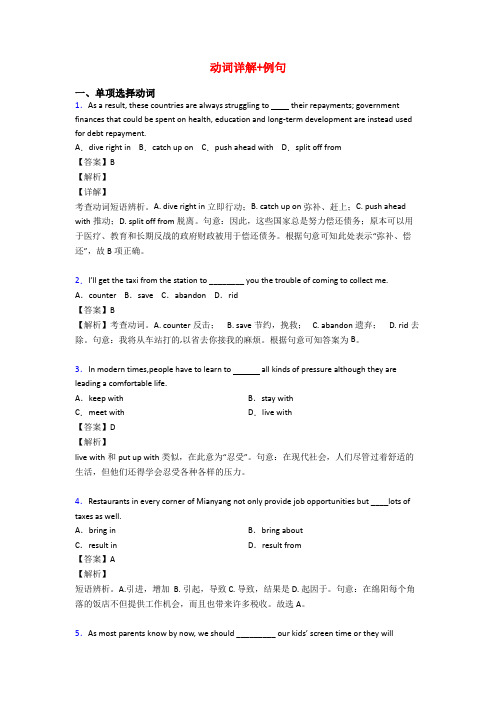
动词详解+例句一、单项选择动词1.As a result, these countries are always struggling to their repayments; government finances that could be spent on health, education and long-term development are instead used for debt repayment.A.dive right in B.catch up on C.push ahead with D.split off from【答案】B【解析】【详解】考查动词短语辨析。
A. dive right in立即行动;B. catch up on弥补、赶上;C. push ahead with推动;D. split off from脱离。
句意:因此,这些国家总是努力偿还债务;原本可以用于医疗、教育和长期反战的政府财政被用于偿还债务。
根据句意可知此处表示“弥补、偿还”,故B项正确。
2.I’ll get the taxi from the s tation to ________ you the trouble of coming to collect me. A.counter B.save C.abandon D.rid【答案】B【解析】考查动词。
A. counter反击; B. save节约,挽救; C. abandon遗弃; D. rid去除。
句意:我将从车站打的,以省去你接我的麻烦。
根据句意可知答案为B。
3.In modern times,people have to learn to all kinds of pressure although they are leading a comfortable life.A.keep with B.stay withC.meet with D.live with【答案】D【解析】live with和put up with类似,在此意为“忍受”。
- 1、下载文档前请自行甄别文档内容的完整性,平台不提供额外的编辑、内容补充、找答案等附加服务。
- 2、"仅部分预览"的文档,不可在线预览部分如存在完整性等问题,可反馈申请退款(可完整预览的文档不适用该条件!)。
- 3、如文档侵犯您的权益,请联系客服反馈,我们会尽快为您处理(人工客服工作时间:9:00-18:30)。
—No wonder she is always so energetic.
A.set asideB.put awayC.work outD.pick up
考点:考查动词短语辨析
4.A long road tests a horse’s strength and a long-term task ________ a man’s heart.
A.provesB.will proveC.is provingD.has proved
【答案】A
【解析】
试题分析:考查动词时态。句意:路遥知马力,日久见人心。这是一条谚语,故用一般现在时态,故选A。
考点:考查动词时态
5.He has behaved in the most extraordinary way; I can’this actions at all.
A.account forB.call forC.send forD.reach for
【答案】A
【解析】
考查动词短语。account for “解释”; call for“需要;要求”; send for“派人去请(拿);召唤”; reach for “伸手去拿”。由题意可知A项正确。
考点:考查动词辨析及固定搭配
3.These rules ________ new members only.
A.are applied toB.apply for
C.apply toD.are applied for
【答案】C
【解析】
试题分析:考查动词短语。短语apply to sb for sth向某人申请某物;apply to适用...;句意:这些规则只适用于新成员。根据句意可知C项正确。
【答案】C
【解析】
【详解】
考查动词辨析。句意:这种植物的外表很像草,所以学生们很难区分它们。A. reflects反射;B. instructs命令;C. resembles类似;D. shapes使…成形,根据题意,故选C。
2.Though Tom was physically challenged, he did not _______ himself to his fate.
【英语】动词详解+例句
一、单项选择动词
1.This kind of plant ______ grass in appearance , so it’s difficult for the students to tell them.
A.reflects B.instructs
C.resembles D.shapes
A.resistB.reserveC.resignD.rescue
【答案】C
【解析】
试题分析:考查动词辨析及固定搭配。动词resist反对,抵制;忍耐,抵抗;reserve预约;保留;储备;resign辞职;放弃;屈从;勉强接受;rescue救援;动词短语resign oneself to...听从,顺从;句意:尽管Tom生理有缺陷,但他没有顺从命运的安排。上下文之间为转折关系,根据句意可知C正确。
【答案】A
【解析】
【详解】
考查动词短语辨析。句意:——不管玛丽有多忙,她都会留出一些时间每天锻炼。——难怪她总是那么精力充沛。A. set aside留出;B. put away抛弃;C. work out解决,算出;D. pick up捡起。由“No wonder she is always so energetic.”可知,她总是那么精力充沛是因为管玛丽有多忙,她都会留出一些时间每天锻炼。故选A。
A.make upB.account forC.apply forD.take up
【答案】B
【解析】
【详解】
考查动词短语辨析。句意:最近的寒冷天气使居民们无法出门,这可能是购物中心客流量下降的原因。A. make up编造,化妆;B. account for对……作出解释,说明……的原因;C. apply for申请;D. take up拿起,开始从事。结合句意故选B。
10.Although the long sentence and difficult structures in this novel have been ______, it still keeps much of the charm and favor of the original.
A.occupied B.polished
17.If you have any doubts about your health, you’d better______ your doctor at once.
A.convinceB.consult
C.avoidD.affect
【答案】B
【解析】
【分析】
【详解】
考查动词词义辨析。句意:如果你对你的健康有任何疑问,你最好立刻向你的医生咨询。A. convince说服;B. consult咨询;C. avoid避免;D. affect影响。健康有问题应该咨询医生。故选B。
A.suits; fitsB.meets; fitsC.matches; suitsD.fits; matches
【答案】D
【解析】
【详解】
考查动词辨析。句意:——你认为我今天穿得夹克衫和戴得帽子怎么样?——我认为这件夹克衫不适合你,你的帽子与你的夹克衫不匹配。meet指满足。fit指大小、形状的合适,引申为吻合、协调。suit指合乎需要、口味、条件、地位,以及花色、款式等与某人的皮肤、气质、身材或身份相称。match多指大小、色调、形状、性质等的搭配。夹克衫是大小、形状是否适应某人,帽子和夹克衫是搭配,故选D。
C.simplified D.recited
【答案】C
【解析】
【详解】
考查动词词义辨析。句意:虽然这部小说的长句和难句结构被简化了,但仍然保留了原著的许多魅力和偏爱。A. occupied占用B. polished修改C. simplified简化D. recited背诵。根据句意可知,选C。
11.Having a brother or sister protects adolescents against negative feelings such as lonso have to learn to ___________and to control their emotions.
14.It's surprising that your brother _______ Russian so quickly-he hasn't lived there very long.
A.picked upB.looked up
C.put upD.made up
【答案】A
【解析】
【详解】
考查动词词组辨析。句意:你哥哥学俄语学得这么快,真令人吃惊——他在那儿住的时间不长。A项,pick up “捡起;(尤指偶然地、无意地、不费劲地)得到;学会;爬起;接载”;
12.While in university, we were offered a number of afterschool activities to _____ our social skills.
A.createB.growC.developD.settle
【答案】C
【解析】
【详解】
考查动词词义辨析。句意:在大学期间,学校给我们提供许多的课外活动用于培养我们的社交技能。A.create创造;B.grow成长;C.develop发展;养成;D.settle安顿;解决。develop可以表示培养的意思,故选C。
A.competeB.compensate
C.comprehendD.compromise
【答案】D
【解析】
【详解】
考查动词词义辨析。句意:有兄弟姐妹可以保护青少年免受孤独和内疚等负面情绪的伤害,但他们也必须学会妥协和控制自己的情绪。pete竞争,比得上;B. compensate补偿,报酬;C. comprehend理解,领会;D. compromise妥协。根据and to control their emotions可知,此处指“学会妥协”。故选D。
8.The friendly atmosphere of the two sides was a _______ sign ; the meeting ______ successful.
A.profitable; profitedB.beneficial; benefited
C.promising; promisedD.promised; promised
13.—What do you think of the jacket and the hat I wear today?
—I don’t think this jacket ________ you and that your hat ________ this jacket perfectly.
A.distribute B.disturb C.dominate D.distinguish
【答案】D
【解析】考查动词。A. distribute分配;B. disturb打扰;C. dominate控制;D. distinguish区别。动荡/生态脆弱地区因人口繁衍和经济发展遭受着更严重的损失,与此(总体)相比,其中由于人为原因引起的全球变暖所导致的一部分(致死和经济受损)很难明显地区分开来。根据句意可知答案为D。
B项,look up “向上看;改善;拜访(某人);查找”;C项,put up “举起;张贴;建造;提高;提供食宿”;D项,make up “组成;补足;弥补;编造;化妆”。根据句意,只有A项符合句意,“picked up Russian”意为“学会了俄语”。故正确答案为A。
